Text
The most frustrating result of this is how frequently you WILL get sucked into the depths of despair and suffering that are citation loops/blackholes (is there a better term for this phenomenon? bc I swear there is and I'm blanking). Where source A cites source B, and source B cites source C, source C sites source D, and THEN in the worst possible turn of events that absolutely does occasionally make me question my innate hope and love for humanity, source D.....cites source B. The realization that there is no actual source for it, only lots of people taking other sources at their word and repeating each other like some sort of horrible, textual Groundhog Day (1993)-esque loop. It makes me seethe, writhe in genuine agony. Have I frustration-cried before when confronted with this scenario? Yes.
I'm being dramatic but this is very underrated and genuinely good advice. Interrogate your sources, friends!
General research tip: don't just trust a book or something simply because it has citations; take the time to actually investigate those citations. People can and do sometimes cite bad or questionable sources.
342 notes
·
View notes
Text

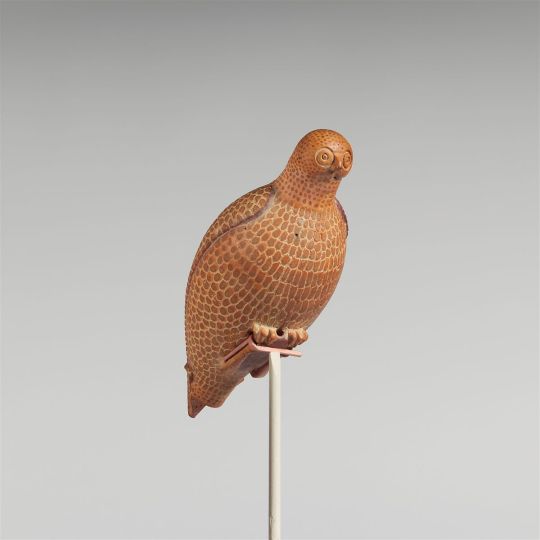
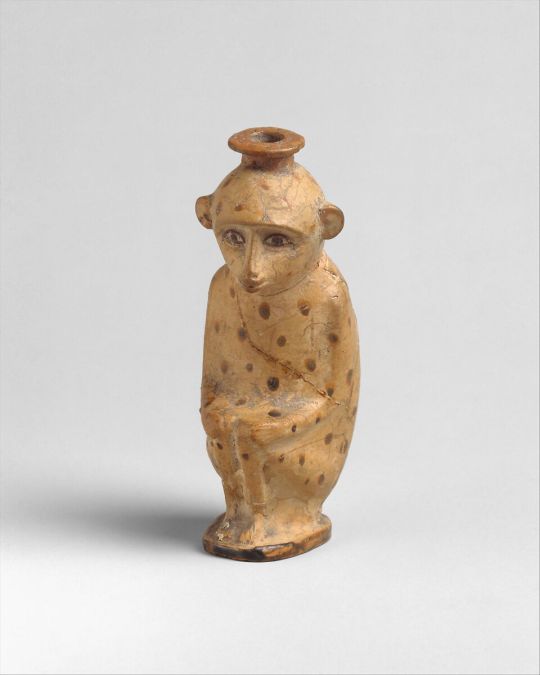
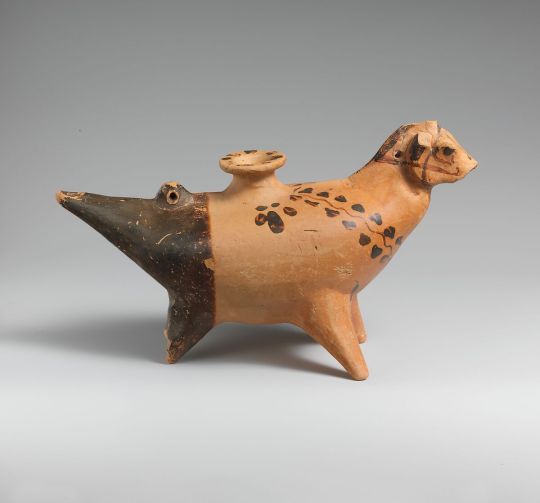
I'm sorry okay but I cannot stop thinking about these animal-shaped vases from different Greek and Pre-Greek cultures. Bring back beautiful animal vases in very impractical and inconvenient shapes NOW, imagine using these, it would be glorious
Top left: Bull's head terracotta vase, Minoan, 1450-1400 BCE
Top right: Perched bird terracotta vase, Proto-Corinthian, 7th century BCE
Bottom left: Sitting monkey terracotta vase, Archaic Rhodian, 6th century BCE
Bottom right: Three-legged horse terracotta vase, Archaic Greek, 6th century BCE
From the Met Collection
#hellenism#ancient greece#classical antiquity#classical archaeology#archaeology#ancient art#they just dont make terracotta vases like they used to man#hey buddy pass the milk for my tea#yeah sure thing heres the milk monkey
15 notes
·
View notes
Text
any Hermes art that portrays Hermes looking like a cheeky little bastard fella is good Hermes art

2K notes
·
View notes
Text

Sculpture of a running Artemis
Marble, Greco-Roman, 2nd century BCE - 1st century CE
St. Louis Art Museum
#artemis#diana#ancient greece#hellenism#greek polytheism#archaeology#polytheism#classical mythology#classical antiquity#classical archaeology
100 notes
·
View notes
Text
The point of this post is 100% correct....kinda; that Athena is not some agent of patriarchy who works against women and shouldn't be solely understood by Roman conceptualizations of Minerva and other myths. However...? Idk I find it funny when the "anti-Roman sources" crowd of Hellenism cries about people using the "wrong" sources and the misapplication of them towards Hellenism or that "people don't bother to read the other sources" about Medusa because most of that info here is either wrong or misleading and clearly they themselves have not read enough of the Greek sources about Medusa. So I'm gonna break that down:
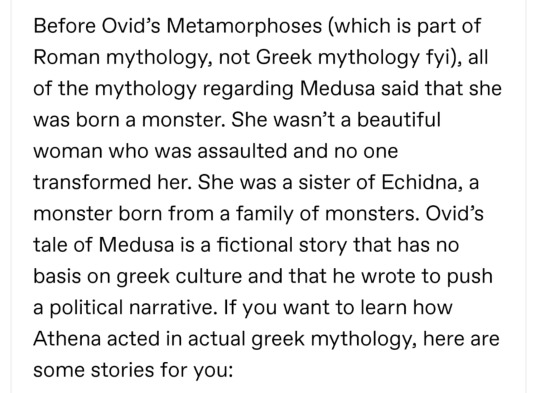
Myth: "Before Ovid's Metamorphoses all of the mythology regarding Medusa said that she was born a monster", "she wasn't a beautiful woman who was assaulted and no one transformed her", "Ovid's tale of Medusa is a fictional story that has no basis on Greek culture"
What actual Greek sources say: "Gorgones who, beyond the famous stream of Okeanos, live in the utmost place toward night, by the singing Hesperides : they are Sthenno, Euryale, and Medousa, whose fate is a sad one, for she was mortal, but the other two immortal and ageless both alike. Poseidon, he of the dark hair, lay with one of these, in a soft meadow and among spring flowers." (Hesiod, Theogony).
"Perseus took flight and made his way to Okeanos, where he found the Gorgones sleeping. Their names were Stheno, Euryale and the third was Medousa, the only mortal one: thus it was her head that Perseus was sent to bring back." (Pseudo-Apollodorus, Bibliotheca)
"that son of Danae, who reaped the head of fair-cheeked Medousa" (Pindar, Pythian Ode 12)
"It is affirmed by some that Medousa was beheaded because of Athene, for they say the Gorgon had been willing to be compared with Athene in beauty." (Pseudo-Apollodorus, Bibliotheca)
"After the death of her father, Phorkys (Phorcys), she reigned over those living around Lake Tritonis, going out hunting and leading the Libyans to battle. On one such occasion, when she was encamped with an army over against the forces of Perseus, who was followed by picked troops from the Peloponnesos, she was assassinated by night. Perseus, admiring her beauty even in death, cut off her head and carried it to show the Greeks." (Pausanias, Description of Greece)
Among the incredible monsters to be found in the Libyan desert are wild men and wild women. Prokles affirmed that he had seen a man from them who had been brought to Rome. So he guessed that a woman from them, reached Lake Tritonis, and harried the neighbours until Perseus killed her; Athena was supposed to have helped him in this exploit, because the people who live around Lake Tritonis are sacred to her." (Pausanias, Description of Greece)
We have an early Greek source, from as far back as the 8th-7th century BCE, the Theogony, calling her a mortal and using the word for mortal ("θνητή") that is used elsewhere to describe humans. Now, as for her family and the remark of "a monster born to a family of monsters" which is not necessarily wrong about Medusa's family but there's more context to be had. In Hesiod, the three Gorgon sisters are said to reside near to the garden of the Hesperides and in a scholia on Apollodorus of Rhodes's Argonautica, the Gorgons are said to be the sisters of the Hesperides as well (with parentage of the Hesperides being given in that source to Phorcys and Ceto). Amongst their siblings, they also count the Graia, who (aside from in a play by Aeschylus where they are said to be monsterous) are usually described as just very aged immortal women, even being described by Hesiod as beautiful or "fair-cheeked".
These aged sisters of the three Gorgons aren't the only ones described as beautiful in some sources, Medusa herself is described the same way by Pindar in the 5th century BCE. The term Pindar uses for this is "εύπαράου" (literally "good-cheeked" but oft translated as "fair cheeked" just like καλλιπάρῃος). Interestingly, this term εύπαράου and related terms such καλλιπάρῃος and ἠΰκομος are elsewhere only ever used to describe either beautiful mortal women or to describe goddesses, never monsters. We also have a later Greek source, Pausanias in the 2nd century CE, writing that he's heard versions of the Medusa myth from Greeks in Northern Africa who posit that the "traditional" Medusa myth originally came from a mortal, human Libyan woman who was slain by Perseus for being antagonistic to the people of Lake Tritonis. This version of the myth, within the Greek world and from a Greek source, also says she was beautiful and that Perseus admired her beauty even in death. Apollodorus, in his Bibliotheca, states that others compared Medusa to Athena for being so beautiful.
If we continue down this trail of a beautiful Medusa, we have to look at artistic representations. Of course, everyone knows the iconic "grotesque" depictions from not only the Greek world but also the Etruscan and Roman worlds (among others). But within Greek art, a tradition evolved around depicting her as a beautiful woman. Here are some vases that depict parts of the Medusa myth and they only Medusa as non-threatening (sleeping peacefully before being killed or her face being composed after death). She is not given wild hair or grotesque features and the only non-human characteristics shown are her wings which do not inherently imply monstrosity in Greek vase paintings. Scholars such as Marjorie J. Milne, when discussing one of these vases described it as such, "it is one of the earliest illustrations of the story to show the Gorgon not as a hideous monster but as a beautiful woman." Madeline Glennon, with the Department of Greek and Roman art at the MET, when describing the transformation of Medusa within Greek art said "Medusa's appearance changes drastically through the Archaic, Classical, and Hellenistic periods, from a grotesque creature to a beautiful female".

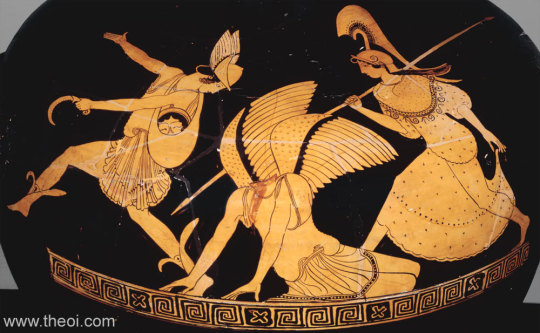

Content warning for mentions of potential assualt.
Now, as for the portion of Ovid's tale which describes an assault perpetuated by Poseidon. It's true that this narrative is not wholly reflected in the Greek myths. We do know that Poseidon impregnates Medusa which later leads to the "births" of Pegasus and Chrysaor. This connection between Poseidon and Medusa is well attested, it's depicted in archaic Greek pottery and also stated by Hesiod. The problem with Hesiod is that he rarely describes assault as assault. For example, the assault of Persephone by Hades is only described as the goddess "being taken" within Hesiod's works and we have to look towards other sources, such as the Homeric Hymns, to get a better understanding of what this means so it's not outside of the realm of possibility that Hesiod's "Poseidon laid with one of the Gorgons" could have been non-consensual.
Nevertheless, she is still not punished by Athena for any consensual affair or for being the victim of an assault. However, Apollodorus says that Athena DID punish her for being compared to the goddess in beauty. In this version, she sends Perseus to kill Medusa all because Medusa had been willing to be compared to Athena in beauty, NOT because Medusa herself has said she was more beautiful, not because of any hubris on Medusa's part, but on the part of someone else and Medusa suffered for it.
In truth, this isn't me flaming the OP, much to my frustration it's insanely common to have this view of the Greek versions of Medusa. (And I do means versions, plural, because there is no singular narrative for almost anyone in Greek mythology, and Medusa is no exception. There is certainly a monstrous, violent Medusa just as there is a peaceful, victimized, beautiful Medusa within Greek mythology and art.) But also, I get ever so slightly annoyed when I hear that there is some sort of harsh separation between the Roman Medusa and the Greek Medusa. Almost everything about the Roman myth has some reflection in Greek myth. Not to mention that OP warns against using the Ovidian version of Medusa to understand Athena's behavior in myth on the basis of it being Roman mythology and not Greek, but then goes on to recommend Hyginus (another ROMAN source) in order to understand her "true" behavior? Why would one Roman source be valid to use for understanding a Greek deity, but another is described as invalid, wrong, and fictional? ("Fictional" is such a weird way to describe Ovidian myths here anyway. Painting it as some sort of invalid source BECAUSE its "fictional" and juxtaposing that with other literary myth sources which are apparently not "fictional" or are magically without motives on behalf of their authors. There's some weird bias here, anti-Ovid but not anti-Roman-sources-generally and the logic is not logic-ing.)
Medusa was a mortal woman serving as a priestess to Minerva in Ovid. In the various Greek sources discussed, she is certainly mortal, in some places she was understood as a mortal woman who, in Pausanias' Description of Greece, lived in a place sacred to Athena. In that version, her desecration of a place sacred to Athena (Lake Tritionis and its peoples) is what angered the goddess.
Medusa was originally a beautiful mortal in the Roman tale. In the Greek sources, she's described or portrayed as beautiful in quite a few works throughout time.
In the Roman myth, Athena is insulted by something which victimizes Medusa (an assault) and punishes her for it by transforming her into a monster. In the Greek sources, Athena is insulted by the hubris of others that have compared Medusa to her in beauty and punishes Medusa for it by sending Perseus to kill her.
In Ovid, Poseidon assaults her. In Greek sources, she is either assaulted or participates in a consensual affair with Poseidon and later "births" children she conceived by him.
In OPs post, Medusa is described as a monster amongst a family of monsters. In the various Greek sources, Medusa is alternately described as a mortal, a maiden, OR a monster depending on the source and there is NO singular agreement or "canon". Her family contains both monsters AND goddesses.
And again, OP's actual point about Athena holds VERY true and I also hate seeing others try to blame or even diminish Athena for the Roman Minerva-Medusa myth, warping literally everything about her actual context and roles. It is good and necessary to make the point that OP is making. I'm making a point entirely separate from the original, about Medusa in the Greek sources. That this imagined harsh divide between certain Roman and Greek myths and practices is so different from the reality of it all. They are separate cultures, but they are separate cultures in one world; coexisting and syncretizing out their asses on both ends and that's great! It's also just a pet peeve when people insist on this about Medusa specifically. It becomes this circle of misinformation; dissing anything Roman, deciding which sources are "valid" based solely on your personal preferences, and trying to show up other helpols because "aha gotcha, that's not actually a Greek myth, Ovid is Roman!!!" when they themselves don't even know the reality of Medusa in the Greek sources either.
A response to the “Athena is a victim blamer and hates women” crowd
The idea that Athena punishes victims of rape is very popular in today’s culture because of how famous Ovid’s retelling of the Medusa myth has gotten. It hurts me that people think that Athena hates assault victims because of 1 (one) story written by a man who hated authority figures and wanted to slander the gods.
Before Ovid’s Metamorphoses (which is part of Roman mythology, not Greek mythology fyi), all of the mythology regarding Medusa said that she was born a monster. She wasn’t a beautiful woman who was assaulted and no one transformed her. She was a sister of Echidna, a monster born from a family of monsters. Ovid’s tale of Medusa is a fictional story that has no basis on greek culture and that he wrote to push a political narrative. If you want to learn how Athena acted in actual greek mythology, here are some stories for you:
- When Ajax The Lesser raped Cassandra at a temple of Athena, Athena punished him and the greeks who failed to chastise him by sending a storm that sank their fleet. Ajax was shipwrecked and drowned, while his people, the (historical) Opuntians, were told by Apollo that to appease the goddess they would have to send maidens to the Trojan land for the next 1000 years, when the maidens arrived there they became priestesses of Athena.
- In Hyginus’ Fabulae, when the princess Nyctimene was found crying in the woods because her own father had raped her, Athena transformed her into her sacred owl and appointed her as her animal companion.
- In Ovid’s Metamorphoses (I’m only using this as a source to show how selective people are), Coroneis, princess of Phokis, was chased down by Poseidon. She cried out to Athena and the goddess transformed her into a crow to save her from the rape.
- For Hera’s sake, Athena IS a victim of attempted rape. In mythology, Hephaestus tried to force himself on her and she fought him off. The myth explicitly says that she felt disgusted by this.
Besides Ovid’s Metamorphoses Book 4, in every other myth about Athena and rape she is completely against it, protects the woman in danger and punishes the rapist.
Also, let’s talk about how in ancient times the cult of Athena was a escapeway for women. “The cult of Athena provided women in ancient Greece not only with a purpose outside the home and childbearing but a significant role in the life of the city. In the Athenian culture, which regularly suppressed feminine energy, even while celebrating it through their patron deity, Athena’s cult was an opportunity for women to express themselves, be recognized, and contribute to the religious and cultural life of the city.” (World History Encyclopedia, Joshua J. Mark)
In the Parthenon, a famous temple of Athena, there was a statue of Pandora, the first of womankind, where she was honored. (Pausanias, Description of Greece 1. 24. 5)
It’s worth noting that 99% of the sources that we have about ancient greece were written by aristocratic men, we have little to no idea of how women viewed and worshipped the gods. To sum it up, before y’all call Athena an anti-feminist, a rape enabler, or a victim blamer PLEASE read actual mythology and put some respect on Athena Axiopoenus (the avenger against injustice)’s name <3
491 notes
·
View notes
Text
yr locked in a room alone with three adult men but you feel perfectly safe. who are they
271K notes
·
View notes
Text
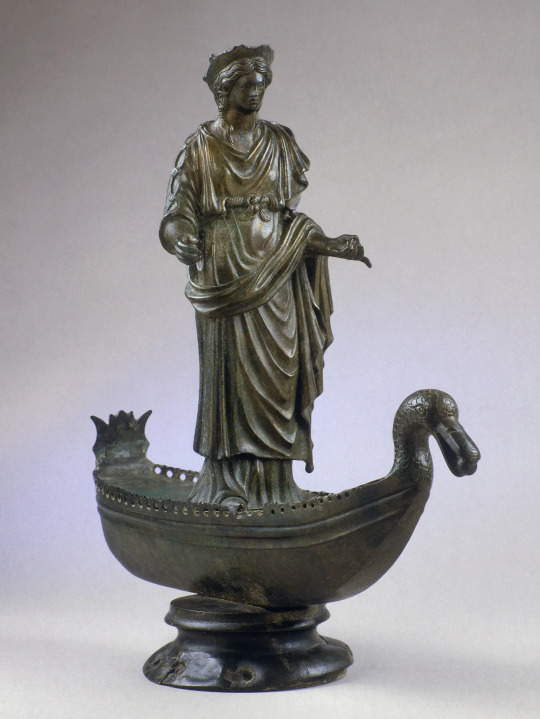
The Celtic goddess Sequana in her duck-boat.
Bronze, Gallo-Roman era, Archaeological Museum of Dijon
#cultus deorum#celtic#celtpol#gaulpol#gallo-roman#archaeology#roman archaeology#celtic art#sequana#polytheism#gaulish polytheism#gaul#oh she comin#the duck is holding a ball in its mouth#also the boat is LITERALLY a duck#it doesnt get better than this my friends
109 notes
·
View notes
Text

#hector with the good hair#you read the iliad the first time for Achilles and Pat#you REread it dozens of more times for the Hector content#he keeps ya coming back#now i need to go look at art of the helmet moment with Astyanax during his farewell to Andromeda and their baby boy.....and then cry#gods i hate Neoptolemus SO much in literally every version of the troy myths
796 notes
·
View notes
Text
this year we celebrate pride month by reigniting the great schism of 1054! which christian denomination will win and which will sashay away?
368 notes
·
View notes
Text

~ Aphrodite and Eros Finger Ring.
Culture: Greek
Period: Hellenistic
Date: 4th-3rd century B.C.
Place of origin: Lower Italy , "in the provinces of the Kingdom of Naples in a tomb".
Medium: Gold
344 notes
·
View notes
Text
My Drive Resource Libraries
Feel free to download, share, etc. I found most everything through open access journals, JSTOR, Anna's Archive, sci-hub, pdfs shared on other sns, etc.
Greek Polytheism & Hellenism
Roman & Italic Polytheism
Gaulish & Gallo-Roman Polytheism
Celtiberian Polytheism
#hellenism#helpol#cultus deorum#greek polytheism#polytheism#roman polytheism#gaulpol#gaulish polytheism#gaulish pagan#celtiberian
430 notes
·
View notes
Text


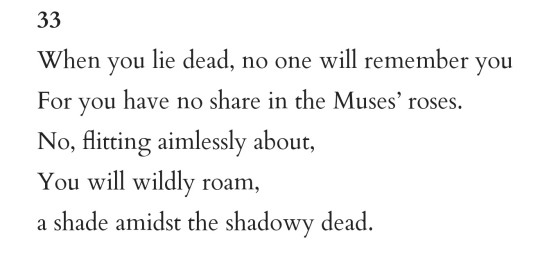

Memory in the fragments of Sappho
6 notes
·
View notes
Text
Content Thieves PSA
If you write spirit work posts or witchy posts in general I seriously suggest you check out this blog and it’s discord for potentially stolen content.
They have stolen from a lot of prominent bloggers trying to pass off their info as written by their mod team. 3 of my posts were stolen and one was even posted on their tumblr as if they wrote it themselves. When I confronted them they claimed being neurodivergent as the reason they are plagiarizing posts. They deleted my stolen content from their blog but them sharing my resource as their own was blatant plagiarism.
Their discord is here https://href.li/?https://discord.gg/6cgfB7rV3g where they have posted 100s of stolen blog posts with NO sources. This is one of multiple discord servers they have. They also have servers for pagan spaces, crystal, herb magic and others.
According to other mods I have spoken to they have done this a lot and are banned in other spaces for plagiarism and stealing content.
No where on their discord does it say the content is not theirs and they do not link the original posters or give credit anymore.
Check for your content as there was a lot of common posts that float around on there without any sources.
Link to my plagiarized post.
389 notes
·
View notes
Text
As I get older I find reading classics (especially the stoics) very humbling because old farts have been bitching and moaning the exact same rant about kids these days for as long as there have been kids or days to bitch about. Whenever I get mad about tiktok audios or whatever that little voice in my head is like "Do you wanna end up like Cato? You sound real Cato right now"
#resist cato#join the bacchic mysteries instead#and maybe dont hold on to grudges so intensely#carthage isnt reaaaally that bad#they dont actually need to be destroyed i promise
3K notes
·
View notes
Text
ooooohoooohohooh im going feral, my eyes are watering, this is nice

"You can finally rest now.."
Hercules and Hebe (ft. Hera)
226 notes
·
View notes
Text
"Dionysus' quality resided in his unhomeric penchant for coming to his worshipper spiritually as well as physically: he led man out of himself to a better existence."
-Dietrich, "Divine Madness and Conflict at Delphi"
87 notes
·
View notes